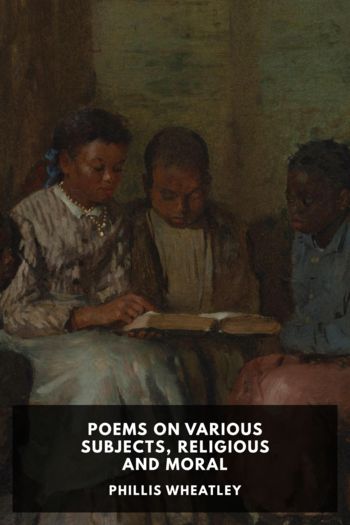The Autobiography of Benjamin Franklin, Benjamin Franklin [best books to read for young adults txt] 📗

- Author: Benjamin Franklin
Book online «The Autobiography of Benjamin Franklin, Benjamin Franklin [best books to read for young adults txt] 📗». Author Benjamin Franklin
Keimer wore his beard at full length, because somewhere in the Mosaic law it is said, “Thou shalt not mar the corners of thy beard.” He likewise kept the Seventh day, Sabbath; and these two points were essentials with him. I disliked both; but agreed to admit them upon condition of his adopting the doctrine of using no animal food. “I doubt,” said he, “my constitution will not bear that.” I assured him it would, and that he would be the better for it. He was usually a great glutton, and I promised myself some diversion in half starving him. He agreed to try the practice, if I would keep him company. I did so, and we held it for three months. We had our victuals dressed, and brought to us regularly by a woman in the neighborhood, who had from me a list of forty dishes, to be prepared for us at different times, in all which there was neither fish, flesh, nor fowl, and the whim suited me the better at this time from the cheapness of it, not costing us above eighteenpence sterling each per week. I have since kept several Lents most strictly, leaving the common diet for that, and that for the common, abruptly, without the least inconvenience, so that I think there is little in the advice of making those changes by easy gradations. I went on pleasantly, but poor Keimer suffered grievously, tired of the project, longed for the flesh-pots of Egypt, and ordered a roast pig. He invited me and two women friends to dine with him; but, it being brought too soon upon table, he could not resist the temptation, and ate the whole before we came.
I had made some courtship during this time to Miss Read. I had a great respect and affection for her, and had some reason to believe she had the same for me; but, as I was about to take a long voyage, and we were both very young, only a little above eighteen, it was thought most prudent by her mother to prevent our going too far at present, as a marriage, if it was to take place, would be more convenient after my return, when I should be, as I expected, set up in my business. Perhaps, too, she thought my expectations not so well founded as I imagined them to be.
My chief acquaintances at this time were Charles Osborne, Joseph Watson, and James Ralph, all lovers of reading. The two first were clerks to an eminent scrivener or conveyancer in the town, Charles Brockden; the other was clerk to a merchant. Watson was a pious, sensible young man, of great integrity; the others rather more lax in their principles of religion, particularly Ralph, who, as well as Collins, had been unsettled by me, for which they both made me suffer. Osborne was sensible, candid, frank; sincere and affectionate to his friends; but, in literary matters, too fond of criticizing. Ralph was ingenious, genteel in his manners, and extremely eloquent; I think I never knew a prettier talker. Both of them were great admirers of poetry, and began to try their hands in little pieces. Many pleasant walks we four had together on Sundays into the woods, near Schuylkill, where we read to one another, and conferred on what we read.
Ralph was inclined to pursue the study of poetry, not doubting but he might become eminent in it, and make his fortune by it, alleging that the best poets must, when they first began to write, make as many faults as he did. Osborne dissuaded him, assured him he had no genius for poetry, and advised him to think of nothing beyond the business he was bred to; that, in the mercantile way, though he had no stock, he might, by his diligence and punctuality, recommend himself to employment as a factor, and in time acquire wherewith to trade on his own account. I approved the amusing one’s self with poetry now and then, so far as to improve one’s language, but no farther.
On this it was proposed that we should each of us, at our next meeting, produce a piece of our own composing, in order to improve by our mutual observations, criticisms, and corrections. As language and expression were what we had in view, we excluded all considerations of invention by agreeing that the task should be a version of the eighteenth Psalm, which describes the descent of a Deity. When the time of our meeting drew nigh, Ralph called on me first, and let me know his piece was ready. I told him I had been busy, and, having little inclination, had done nothing. He then showed me his piece for my opinion, and I much approved it, as it appeared to me to have great merit. “Now,” says he, “Osborne never will allow the least merit in anything of mine, but makes a thousand criticisms out of mere envy. He is not so jealous of you; I wish, therefore, you would take this piece, and produce it as yours; I will pretend not to have had time, and so produce nothing. We shall then see what he will say to it.” It was agreed, and I immediately transcribed it, that





Comments (0)